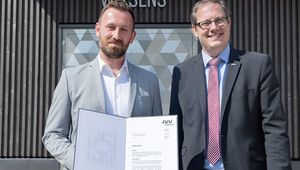Vice-Rector Alberta Bonanni presented DI Dr. Christoph Topf with his Venia Legendi/Habilitation Certificate

Together with Prof. Marko Hapke, Christoph Topf heads the JKU Institute of Catalysis. His post-doc dissertation titled "New Strategies for Base-Metal Catalyzed and Benign Hydrogenation Reactions" focuses on developing new types of homogeneous and heterogeneous catalysts for use in hydrogenation reactions. Catalytic hydrogenation is enormously important to the chemical industry as valuable products, such as pharmaceuticals, agrochemicals, dyes, fragrances and flavorings, are manufactured by means of hydrogenation technology.
The hydrogenations process is typically based on using very expensive compounds made of rare and expensive precious metals, such as ruthenium, rhodium, iridium, platinum, and palladium. As part of his post-doctoral research, Topf has succeeded in synthesizing highly efficient hydrogenation catalysts using tungsten and chromium. Given that the use of these metals for catalytic hydrogenation is not well documented, the research opens the doors to a promising future which the Institute of Catalysis intends to investigate and pursue further.
Those pursuing a habilitation/post-doc undergo an academic evaluation in regard to special qualifications that proves their ability to independently conduct academic/scientific research and teach the entire depth and breadth of their selected subject area [facultas docendi], This, in turn, is the prerequisite to grant authorization to teach that particular subject area [venia legendi].
 Go to JKU Homepage
Go to JKU Homepage













